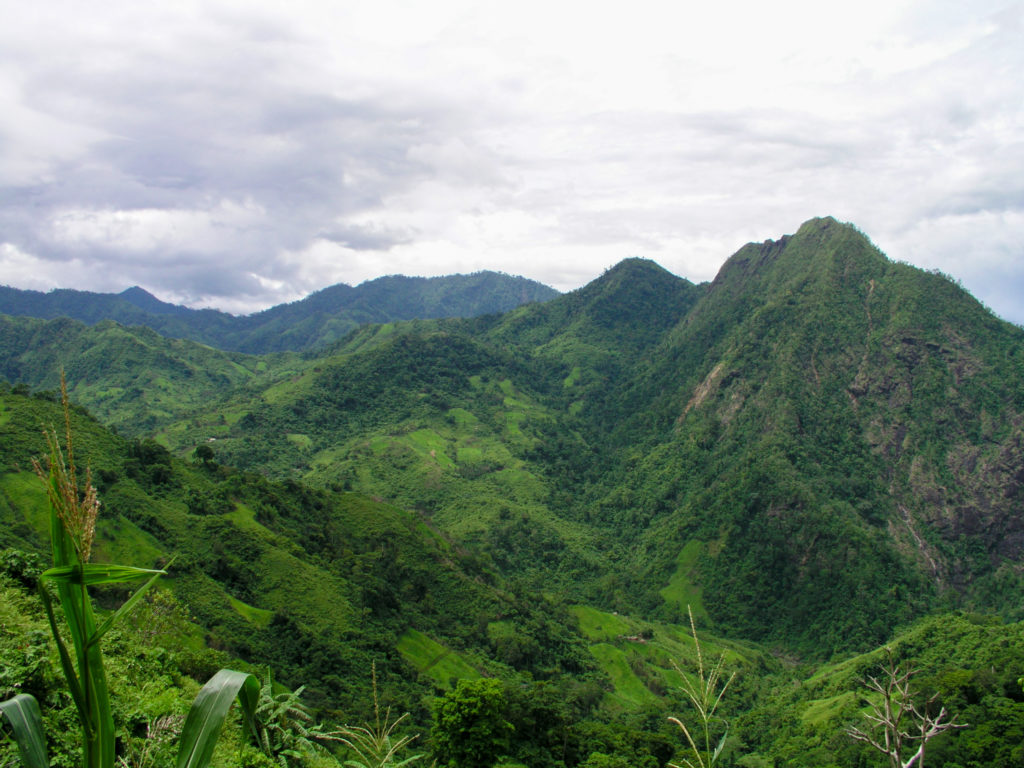Finally, it was here, the day I had been waiting for! Today, I would hike into the remote Kamantian Valley, where few Americans had set foot. Only the strong survived living in Kamantian, and only the strong survived the trip in, or out. Today, I was determined to be counted as one of the strong.
I climbed into the old jeep, and slammed the door with some satisfaction. As old as the jeep was, it was a wonder the door did not fall off. Bumping down the National Highway was enough to jolt off the faulty side window and cause my father to slam on the brakes and send me into the road to help retrieve the window. I hoped a local driver didn’t make roadkill out of me. Humans did not have the right of way here. Vehicles, forces of nature, and the jungle dominated.
The sun beat down like it meant to have us for lunch, and I wilted in my seat. When the road dipped into a river, I came back to life. I took in the depth of the water and the scattering of rocks we would have to cross. The jeep tilted, and I gripped the door. The jeep ride was just the start of our trip, and the mildest portion of the journey. Once we jolted to a stop at the trailhead, it was time to load up and cover the last miles in a hike that typically took three hours.
Several men approached us, dressed in dirty and tattered clothes. They were the first Palawan people I had seen, and our guides and helpers for the hike ahead. They did not appear different than the local men, except for the man in the ba’ag, or loincloth. While my father talked and gestured with the men, I hoisted a bag onto my back, hoping I looked ready for whatever lay ahead.
I shifted my weight from one foot to another and wondered how I might joke with the men. It seemed important to me to be able to do that. The Palawan men lifted their baskets into place, fastening woven straps of bark across their foreheads to securely balance the weight they would carry. I wondered at their ingenuity as I followed them onto the mountain trail.The sun beat down on our shoulders, a slight breeze bringing a bit of relief and rippling through the fields of rice on either side of us.
The trees were lush with life and loud cicada shouts. I am here. I took in my surroundings with eager eyes. Soon we would be within the heart of the jungle. The trees bent close to the path that was grown high with grass. Off to the side was a hut and a field of rice. Today is the beginning of something new, I thought.
I was going where few had gone, hiking a path that held life and death along its way. This was not a trail for the faint of heart or those in a weakened state. I would conquer the trail today.
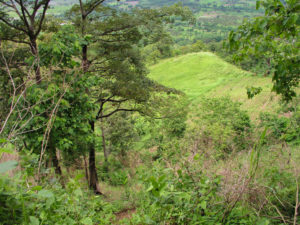
As we pushed forward, the path turned upwards and the sheltering trees were spaced further apart. I later learned that this was the portion of the trail where hikers most often experienced heat stroke. Mercifully, the trail dropped down and into the river. I appreciated the water’s cool relief on my legs. I watched the Palawan men move across the river rocks, as sure-footed as if they were on flat, dry ground. I, too, would walk that way soon, I promised myself.
The water rose against my calves, tugging at me, almost insisting I fall and be initiated. Plant life crowded in around the river, and the sound of rushing, singing water was all I could hear. A waterfall came into sight, refreshing me with it’s spray. The river grew higher and stronger, and I leaned into its grip, a smile on my face.
The Palawan men cut off from the river, hiking into the jungle again. I wondered how they could tell where to exit the river. The jungle all looked the same to my untrained eye. Later, I would be able to read the river too, seeing what today was invisible.
The path was like a living force, and I studied it closely. To do anything else was to risk being swallowed by the jungle. The ground grew muddy underfoot and I chose my steps carefully, trying to keep the mud from filling my flip flops. If I could keep the mud out, I could grip the thin plastic with my toes and get a good sense of the path below.
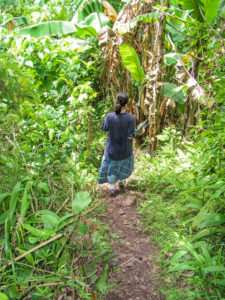
I would soon learn of trail hazards more dangerous than the mud that threatened to slide me off the trail. There were ants that stung like wasps, and long thorns that grew just under the dirt and stabbed unsuspecting hikers. There was also the possibility of meeting deadly snakes, pythons, or a viper so poisonous there was no help if one was bit, only heart failure and a quick death. My senses would waken in this place as they never had.
My anticipation for what lay on the other side of the mountain rose like the path in front of us. We were deep into the wilderness now, and I only wanted more. When the trail leveled off, the Palawan men set their baskets down and leaned against the mountain, single file, to rest. The trail was too narrow for us to group together.
The path became so slender we had to walk one foot in front of the other. There was no room to place our feet side by side, no room for error. My heart beat faster when I saw the bare mountainside ahead. Landslides had rolled through, ripping out trees, leaving the jungle scarred and the trail vulnerable and dangerous. If we misplaced a foot, we could fall without anything to catch onto.
The small rocks underfoot shifted and gave way. Our guides ran across the stretches of trail that slipped away to nothing. If they lost speed and looked down, they would fall. I tasted fear. I felt respect for the trail and these people who knew it, and I ran too, fueled by adrenaline.
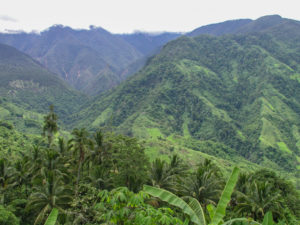
Our efforts brought us to a lookout where the view made my breath catch. Ahead of us loomed a mountain range, and below, the Tamlang river and the Kamantian valley. Jagged cliffs thrust up at the sky. There seemed to be no surfaces, only angles and evidence of landslides. I looked at the small village in the distance. Where will I stand? I will never be able to relax because if I do I will fall off the mountain.
We walked on, and the trail turned down and became treacherous in a new way. It was so steep I often found myself sitting, whether or not I wanted to. The mud on my feet created a slippery surface, causing me to struggle, just to stay upright. Then, in the distance, I spotted several small bamboo huts. I felt energy surge into my rubbery legs, and soon the trail we’d been sliding down, gentled. Much to my relief, we walked onto level ground. The small village sat on hard packed dirt. A long house and several huts with thick grass roofs, broke the jungle’s hold.
Several people came out to meet us. My throat was dry. Was it thirst or the unease of the unknown? “Menungang meriklam,†I said, hoping I had not botched the good morning greeting.
“Menunga gasi,†a man said. This response meant he understood my attempt at communication.
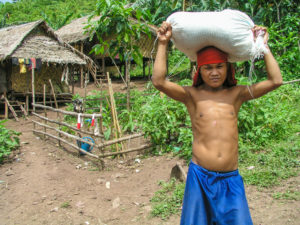
Children edged close to us. A woman with a baby approached. Skinny dogs, nearly hairless, sniffed warily around the outskirts of everyone that had gathered.The men spoke as I scanned the small clearing, already out of words, and anxious to make the last short leg of our journey. I was eager to see the clearing that held the huts and buildings we would work in and call home.
When we began walking again, the trail sloped downward. Grass grew on the path and pot holes littered the way. This was not a trail that got much human use, and hard rains dug it out regularly.
In the second clearing, several taller huts, a clinic, and a bathroom building for the missionaries appeared. Mango and banana trees rose like a challenge around the village. An encircling creek whispered a liquid song. This was my new home. And I was hungry.
I scanned the area for what I might eat. I stuffed a Kereg leaf into my mouth when I learned it was edible. “It needs to be cooked,†our guide laughed as he saw my face. My throat felt like I had swallowed a pincushion. I crossed my arms and planted my feet firmly. My appetite for adventure was only fueled by the discomfort I’d felt so far and the wonders of this wild place.
Many thanks to Esther Lipscomb for capturing this story and to Crissy Williams for her watchful editor’s eye.

